'For non-EU internationals, money slaps differently'
Money must be funny

Tears stream down a student’s face as she reads her emails. Balancing a full course load with a job was impossible, so she reduced her modules to stay afloat. She's just learnt that to complete her degree she needs to register for the following year and pay tuition again. She can’t afford it.
Meanwhile, at a bar nearby, a student celebrates receiving a year of tuition. This is not a scholarship, but a prize he won for filling in a survey. Problems, and money, are of course relative. I submitted my Master’s thesis with 35 euros in my bank account. However, other students wind down at lavish parties at student associations where they can afford to hire sex workers. The associations are university-funded.
Nothing is free in the Netherlands, not even public toilets — unless you can urinate standing up. The numerous urinoirs in Utrecht are a not-so-subtle reminder that some bodies (usually men) are welcome in public spaces while others are ignored by city planners. Sometimes, this invisibility can be useful, just ask dumpster divers.
Students without rich parents need to work to fund their studies. For non-EU internationals, money slaps differently. Most of us come to the Netherlands with ‘weak’ currencies, cash that could sustain us for years lasts only a few months in Europe. We’re told we can work during our studies, but only sixteen hours a week. What they don’t say is that no one is willing to go through the paperwork of getting you a work permit — not even the university. Employers must apply for the permit on the student’s behalf and with the four-to-twelve-week wait time, this option is unattractive.
Dumpster diving doesn’t pay rent and so as a non-EU student, you may be tempted to do zwart werk, literally black work, where you get paid in cash under the table. Naturally, this is illegal. Apps like Temper let you work as a freelancer once you’ve jumped through the hoops of registering your business at the KVK. Amazingly, most of the jobs listed are above minimum wage and thanks to dish-washing all over the city, my bank account has recovered. Like many non-EU internationals, the irony is not lost on me that I need a visa and work permit to survive in the Netherlands, even though the Dutch colonised my country for hundreds of years. The government did say sorry, but apologies don’t pay tuition or rent.
When one deathly submarine trip can fund hundred of PhDs, and the recovery efforts could house thousands of refugees, it becomes obvious that money is just a joke really — one that’s funny for a select few.